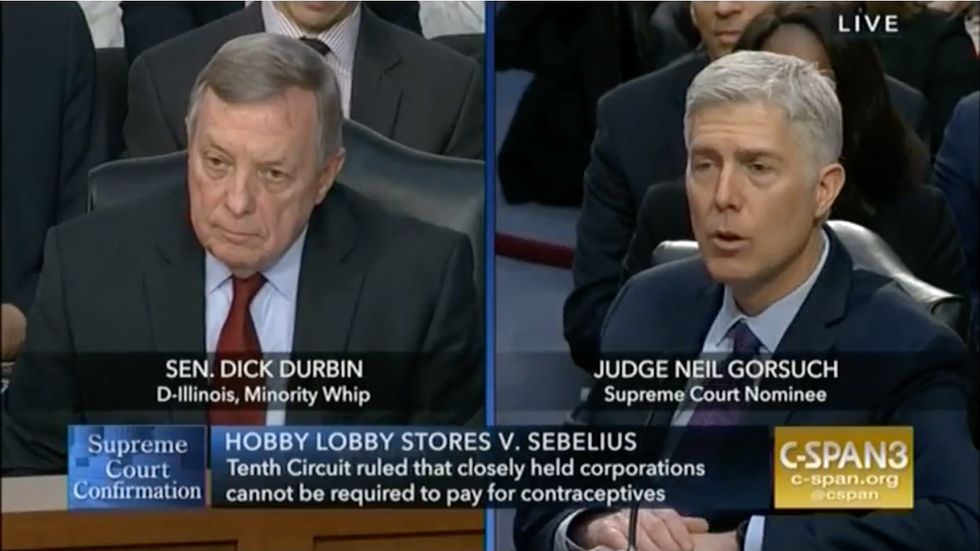
© 2024 Blaze Media LLC. All rights reserved.
Subjects for Neil Gorsuch’s daylong grill session of a nomination hearing for the U.S. Supreme Court ran the gamut from the rights of enemy combatants to science-fiction novels. Amid the grueling hours-long fracas, President Trump’s appointee gave a strong, erudite defense of one of the most misrepresented cases in Supreme Court history.
The case in question was the landmark Hobby Lobby case, which affirmed the religious freedom and property rights of employers against Obamacare’s contraception mandate, and also explained exactly what Congress should do when it doesn’t like the outcome of a case.
Sen. Dick Durbin, D-Ill., tried to trap Gorsuch on the opinion he wrote on the case as a judge for the 10th federal circuit, but was greeted by a breakdown of the facts and showed very clearly how both Gorsuch and the Supreme Court majority arrived at their decisions.
Watch:
One of the most common misunderstandings about the Supreme Court and 10th Circuit decisions is the idea that the courts somehow turned corporations into people for the purposes of the ruling. This was far from the case, Gorsuch explains, breaking down how the imprecision of language in the text of the Obamacare law led to the final decision, which used the Dictionary Act definition of “persons” to include for-profit corporations.
What he didn’t mention was that corporate personhood goes back to ancient Rome; it was not a creation of the Supreme Court in 2014. The case wasn’t some invention of legal fiction, but rather a common-sense reading of the law that Congress passed.
And Gorsuch went even further than defending his own opinion. He politely called out members of Congress who complained about the decision … yet did nothing to amend the legislation itself.
“Congress can change the law,” Gorsuch calmly explained to a visibly perturbed Durbin, adding that Congress could do away with RFRA altogether, or tweak its provisions, to bring the law more in line with how his critics would like it to be read. “[Congress] has all those options available."
Want to leave a tip?
We answer to you. Help keep our content free of advertisers and big tech censorship by leaving a tip today.
Want to join the conversation?
Already a subscriber?
more stories
Sign up for the Blaze newsletter
By signing up, you agree to our Privacy Policy and Terms of Use, and agree to receive content that may sometimes include advertisements. You may opt out at any time.
© 2024 Blaze Media LLC. All rights reserved.
Get the stories that matter most delivered directly to your inbox.
By signing up, you agree to our Privacy Policy and Terms of Use, and agree to receive content that may sometimes include advertisements. You may opt out at any time.



